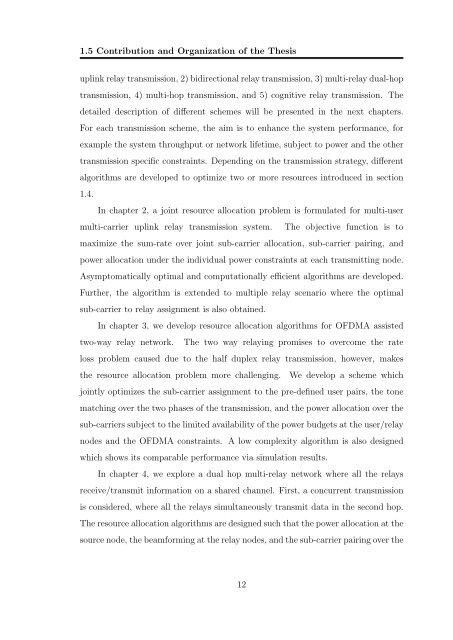Resource Allocation in OFDM Based Wireless Relay Networks ...
Resource Allocation in OFDM Based Wireless Relay Networks ...
Resource Allocation in OFDM Based Wireless Relay Networks ...
Create successful ePaper yourself
Turn your PDF publications into a flip-book with our unique Google optimized e-Paper software.
1.5 Contribution and Organization of the Thesis<br />
upl<strong>in</strong>k relay transmission, 2) bidirectional relay transmission, 3) multi-relay dual-hop<br />
transmission, 4) multi-hop transmission, and 5) cognitive relay transmission. The<br />
detailed description of different schemes will be presented <strong>in</strong> the next chapters.<br />
For each transmission scheme, the aim is to enhance the system performance, for<br />
example the system throughput or network lifetime, subject to power and the other<br />
transmission specific constra<strong>in</strong>ts. Depend<strong>in</strong>g on the transmission strategy, different<br />
algorithms are developed to optimize two or more resources <strong>in</strong>troduced <strong>in</strong> section<br />
1.4.<br />
In chapter 2, a jo<strong>in</strong>t resource allocation problem is formulated for multi-user<br />
multi-carrier upl<strong>in</strong>k relay transmission system. The objective function is to<br />
maximize the sum-rate over jo<strong>in</strong>t sub-carrier allocation, sub-carrier pair<strong>in</strong>g, and<br />
power allocation under the <strong>in</strong>dividual power constra<strong>in</strong>ts at each transmitt<strong>in</strong>g node.<br />
Asymptomatically optimal and computationally efficient algorithms are developed.<br />
Further, the algorithm is extended to multiple relay scenario where the optimal<br />
sub-carrier to relay assignment is also obta<strong>in</strong>ed.<br />
In chapter 3, we develop resource allocation algorithms for <strong>OFDM</strong>A assisted<br />
two-way relay network. The two way relay<strong>in</strong>g promises to overcome the rate<br />
loss problem caused due to the half duplex relay transmission, however, makes<br />
the resource allocation problem more challeng<strong>in</strong>g. We develop a scheme which<br />
jo<strong>in</strong>tly optimizes the sub-carrier assignment to the pre-def<strong>in</strong>ed user pairs, the tone<br />
match<strong>in</strong>g over the two phases of the transmission, and the power allocation over the<br />
sub-carriers subject to the limited availability of the power budgets at the user/relay<br />
nodes and the <strong>OFDM</strong>A constra<strong>in</strong>ts. A low complexity algorithm is also designed<br />
which shows its comparable performance via simulation results.<br />
In chapter 4, we explore a dual hop multi-relay network where all the relays<br />
receive/transmit <strong>in</strong>formation on a shared channel. First, a concurrent transmission<br />
is considered, where all the relays simultaneously transmit data <strong>in</strong> the second hop.<br />
The resource allocation algorithms are designed such that the power allocation at the<br />
source node, the beamform<strong>in</strong>g at the relay nodes, and the sub-carrier pair<strong>in</strong>g over the<br />
12

















